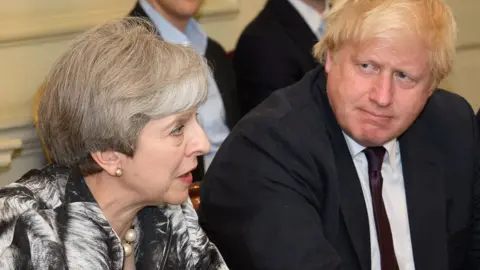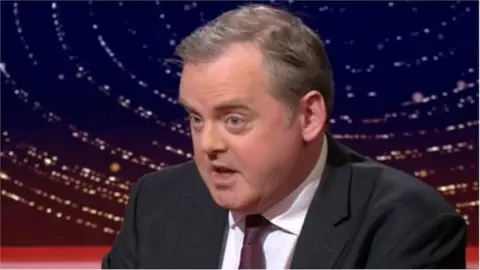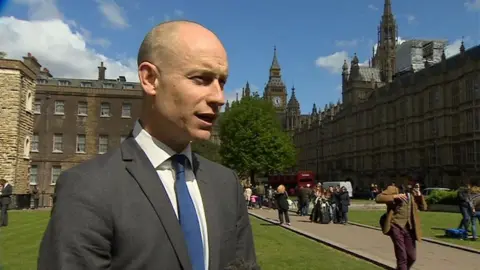Boris Johnson's resignation a selfish act, says Guto Bebb
 PA
PATheresa May has been strengthened by the resignations of Foreign Secretary Boris Johnson and Brexit Secretary David Davis over her Brexit plan, a Welsh member of her government says.
The pair quit the cabinet claiming the plan they agreed to on Friday stuck too closely to EU rules and regulations.
Defence Minister Guto Bebb told BBC Radio Cymru he did not think there would be a leadership challenge soon.
He said many MPs saw Mr Johnson's resignation as a "selfish act".
The Conservative MP for Aberconwy has been highly critical of Brexit-supporting Conservatives in recent weeks.
Tory MPs can trigger a vote of no confidence if 48 of them submit letters to the 1922 backbencher committee, chaired by Sir Graham Brady.
In a letter on Monday, Mr Johnson said the prime minister was leading the UK into a "semi-Brexit" with the "status of a colony".

Mrs May said she was "sorry - and a little surprised" by Mr Johnson's move after his apparent support on Friday.
It followed a cabinet meeting at Chequers to get an agreement on the UK's future relationship with the EU.
An agreement was announced after the 12-hour meeting, but many Brexiteers have been unhappy with the deal which they think will lead to the "worst of both worlds".
'Anger'
Speaking to the Post Cyntaf programme on Monday, Mr Bebb said he did not think there would be a vote of no confidence, and even if there was he expected Mrs May "would win comfortably",
He believed Mr Johnson's resignation bolstered support for Mrs May from Conservative MPs who want a "pragmatic approach" to Brexit.
"I think the fact that she has lost two cabinet members has... strengthened her," he said.
"I think that Boris Johnson's decision to resign has been seen as a selfish act and I think there's anger towards him amongst the parliamentary party,
"There was a feeling that there's a need to defend the prime minister from somebody who has made a decision for his own benefit."
But he said backbenchers had sympathy with Mr Davis, not because they agreed with his objections to the Chequers proposal, "but there was a feeling that he had been slowly pushed out of the process of making decisions".
Former Brexit minister David Jones says Prime Minister Theresa May must be "extremely sensitive" to views in the Tory party over Brexit.
The MP for Clwyd West is a critic of the Chequers agreement.
But he said: "I think that she has to continue. I think that she has so far delivered important elements of Brexit. We've had the notification of withdrawal and we've had the withdrawal bill, which has gone through the house.
"But I think it is necessary that the government is extremely sensitive to the views within the Conservative party here at Westminster because without taking the bulk of the party with it they will not be able to get the legislation through."

Welsh Secretary Alun Cairns defended the Chequers agreement, saying the government had an obligation to protect jobs.
Mr Cairns said: "People are passionate about Brexit. They have strong views and that is in every political party.
"But providing we are sticking to the principles that the prime minister set out and the expectation of the public where we take control of our laws, our borders and our money, and we can also get a trading arrangement that allows Airbus, Toyota and small businesses in Wales to continue to export and be part of supply chains, then that is a win-win.
"It's a win for the UK, its a win for trade deals that we can strike internationally as a result of that, but its also… a win for Europe."
Meanwhile Aberavon Labour MP Stephen Kinnock said the UK government was "going from chaos, to shambles and now in meltdown".
"Theresa May has lost seven cabinet ministers since November," he said.
"It's a rolling crisis. She's in office but not in power."
Mr Kinnock said the Chequers proposal was a "step in the right direction because at least the prime minister was accepting that our future lies with Europe".
But he added that it was still "off beam in terms of what we actually need, which is the clarity and certainty of the European Economic Area Agreement".
The agreement extends membership of the EU's single market to Norway and Iceland.
